When Your HVAC System Fails: Recognizing the Emergency
Emergency HVAC repair is critical when a system failure creates unsafe conditions that threaten your health or property. According to industry data, 70% of homeowners experience an HVAC breakdown during peak seasons when they need their systems most.
Quick Emergency HVAC Action Steps:
- Safety first - Turn off the system immediately if you smell gas, burning, or see smoke.
- Assess the situation - Are indoor temperatures unsafe (above 95°F or below 50°F)?
- Try basic troubleshooting - Check the thermostat, circuit breakers, and air filters.
- Call professionals - Contact a licensed 24/7 HVAC service for true emergencies.
- Take temporary measures - Use fans, space heaters, or other safe comfort solutions while waiting.
When temperatures exceed 95°F or fall below 50°F, your HVAC emergency is a race against time. These extremes put vulnerable family members—infants, the elderly, and those with health conditions—at serious risk.
The good news? Most HVAC emergencies are preventable. Research shows that homeowners who schedule regular HVAC maintenance are 50% less likely to experience an emergency breakdown.
When disaster strikes, responding quickly and safely can prevent further damage and protect your family. Whether it's a furnace failure on a cold night or an AC breakdown during a heatwave, the right response plan makes all the difference.
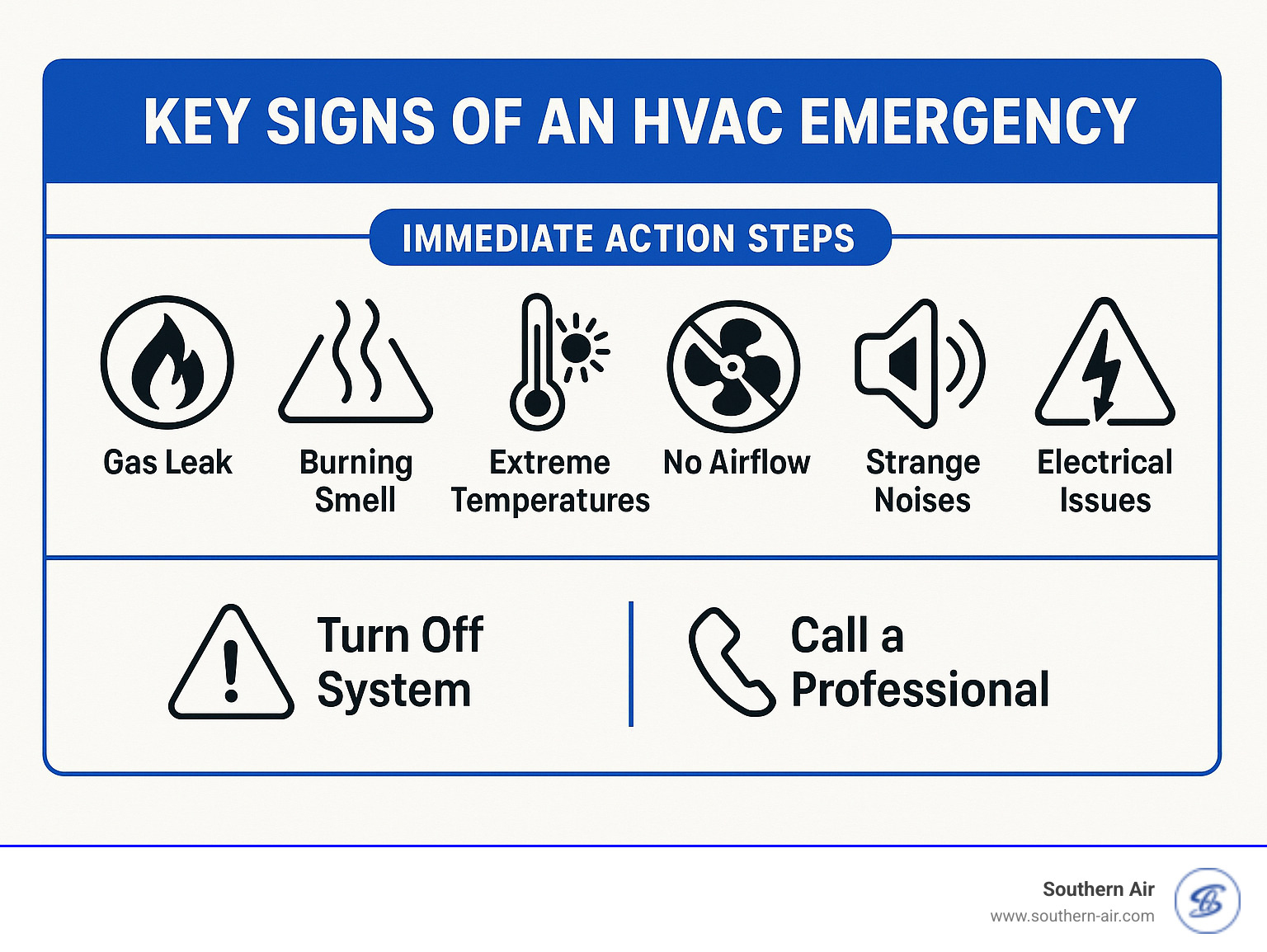
Is It a True HVAC Emergency? Key Signs to Watch For
Not every HVAC problem requires an emergency HVAC repair call that costs extra. The key is knowing when you're dealing with a genuine emergency versus a repair that can wait. A true HVAC emergency threatens your family's health, safety, or property. Over 60% of HVAC emergencies happen during peak seasons, so understanding the difference between "inconvenient" and "dangerous" can save you money and stress.
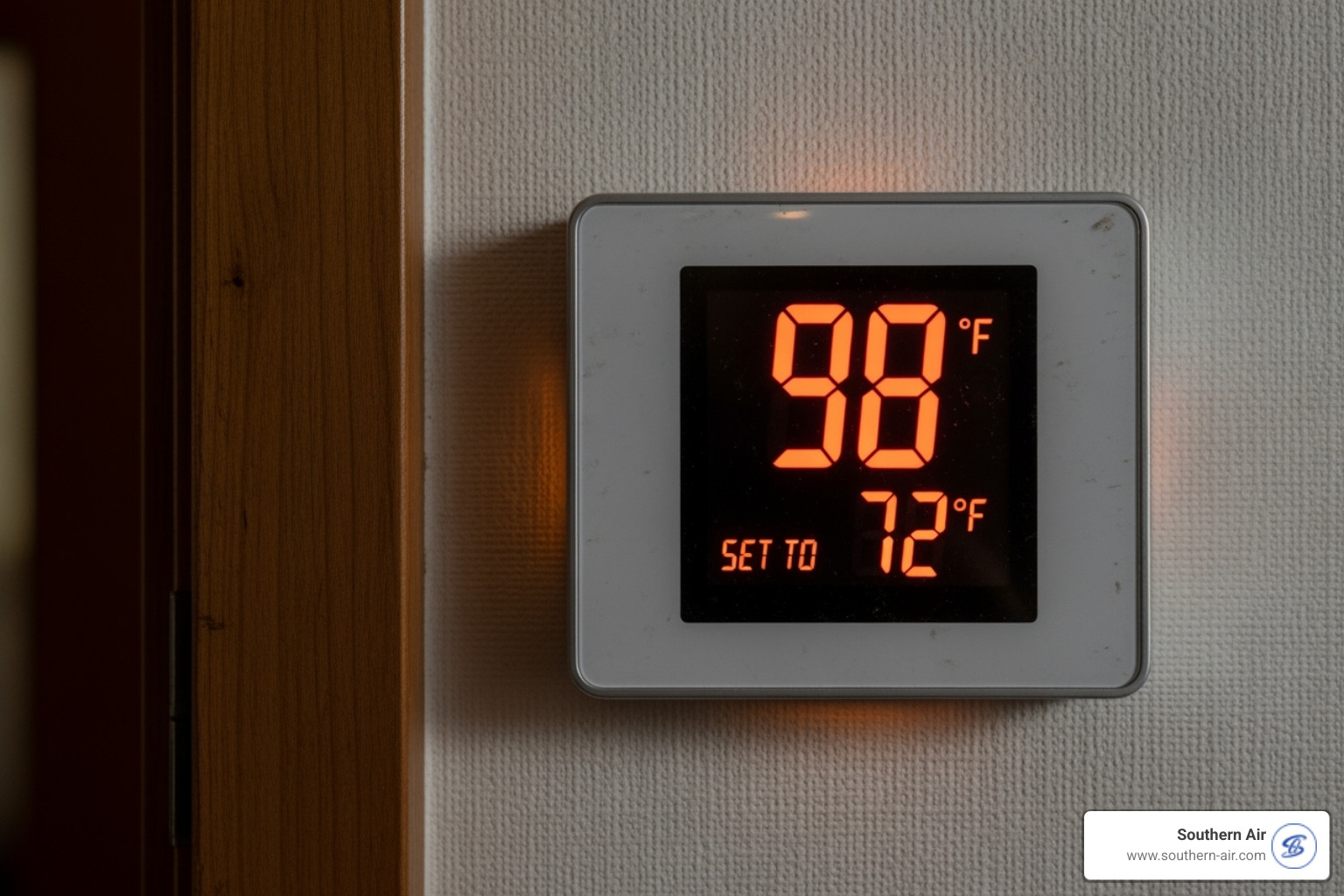
What Constitutes an HVAC Emergency
When your HVAC system puts your family or home at risk, you need immediate help. Gas leaks are a top priority; if you smell rotten eggs, evacuate the house, turn off the gas supply, and call your gas company. Never use light switches or phones inside.
Burning smells or visible smoke from your unit signal potential fire hazards from overheating components or electrical shorts that need immediate attention.
If your HVAC system keeps tripping circuit breakers or you smell burning wires, call for help right away. Electrical issues can become more dangerous if ignored.
Major water leaks can cause thousands in damage quickly, leading to mold growth and structural issues. A spreading puddle is an emergency.
Temperature extremes also create health emergencies. No heat when indoor temperatures drop below 50°F puts everyone at risk, especially children and the elderly, and can lead to frozen pipes.
Conversely, no air conditioning when indoor temperatures climb above 95°F can cause heat exhaustion or heat stroke. The CDC's Heat & Health Tracker shows how dangerous extreme heat is. Don't risk it when vulnerable family members or pets are involved.
Sometimes your system has a complete breakdown. When your AC suddenly stops, it's frustrating and potentially dangerous depending on the weather.
Warning Signs You Can't Ignore
Your HVAC system often gives hints before it fails. Recognizing these warning signs can help you avoid a middle-of-the-night emergency.
Strange noises like banging, grinding, or hissing mean parts are loose, damaged, or about to fail. High-pitched screaming is also not normal.
Weak or no airflow from vents suggests problems with your blower motor, ductwork, or severely clogged filters.
System short cycling—where the unit turns on and off repeatedly—stresses your equipment and often leads to system failure if ignored. This can happen when your AC runs constantly without cooling.
Inconsistent temperatures throughout your home indicate your system isn't distributing air properly.
Unpleasant odors beyond burning smells also need attention. Musty smells can mean mold, while sweet, chemical odors might indicate refrigerant leaks.
Even small water leaks can signal bigger problems like clogged condensate lines or frozen coils. If you're wondering why your AC unit is leaking water, don't ignore it.
About 40% of HVAC emergencies start with thermostat malfunctions. Whether it's a simple thermostat issue or a major component failure, the result is the same: your comfort and safety are at risk.
What to Do Immediately: A Homeowner's First Response Plan
When your HVAC system fails, stay calm and follow a logical response plan that prioritizes safety. Handling an emergency HVAC repair situation effectively starts with these steps.
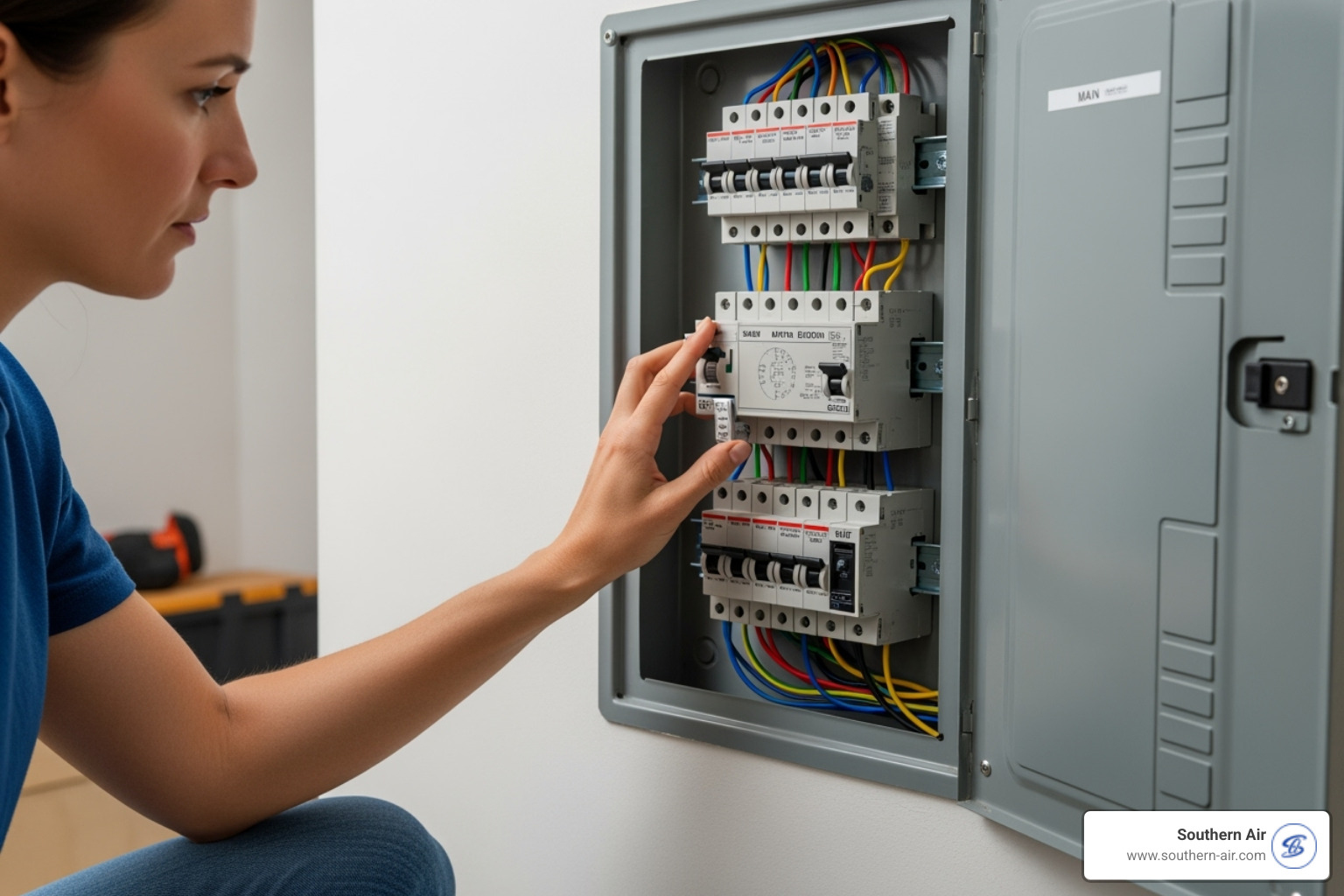
Safety First: Initial Steps
Before attempting any fix, ensure everyone is safe.
Turn off the system immediately at the thermostat if you notice burning smells, strange sounds, or smoke. For more serious concerns like electrical issues, shut off power at the breaker to prevent further damage.
If you have a gas furnace and suspect a leak (rotten egg smell), shut off the gas supply valve near the furnace, evacuate your home, and call your gas company from outside.
Assess for immediate danger like sparking, flames, or water pooling near electrical components. If something feels dangerous, it probably is.
Quick Troubleshooting Before You Call
After ensuring safety, a few simple checks might save you a service call.
First, check your thermostat settings. Ensure it's in the correct mode (heat/cool) with the right temperature setting and fresh batteries.
Next, inspect your air filters. A clogged filter restricts airflow and can shut down your system. If you can't see light through it, replace it. This often resolves issues where an AC is running constantly without cooling.
If the breaker tripped, you can reset it once. Flip it fully off, then back on. If it trips again, stop. A repeatedly tripping breaker signals a serious problem. For more guidance, see our tips for when your AC keeps turning off.
Also, clear debris from your outdoor unit. Leaves and grass can block airflow and cause overheating.
Temporary Comfort Measures
While waiting for professional help, use these temporary solutions to stay comfortable.
- Use fans to circulate air, which creates a cooling breeze in summer and helps distribute heat in winter.
- Close curtains and blinds on sun-facing windows to block heat and lower indoor temperatures.
- Stay hydrated and avoid strenuous activity in extreme temperatures.
- Use space heaters safely for temporary warmth in a single room. Keep them on stable, non-flammable surfaces away from flammable items and never leave them unattended.
- Layer up with extra clothing and blankets in the cold.
- For more ideas, you can find some helpful DIY AC hacks for temporary relief.
These are temporary measures. There's no substitute for professional emergency HVAC repair when your system needs it.
Finding a Reliable Emergency HVAC Repair Service
When your HVAC system fails unexpectedly, finding trustworthy help is a top priority. Taking a few minutes to choose wisely can save you from poor workmanship, inflated prices, and safety hazards. Quality emergency HVAC repair services understand that true emergencies require an immediate, professional response.
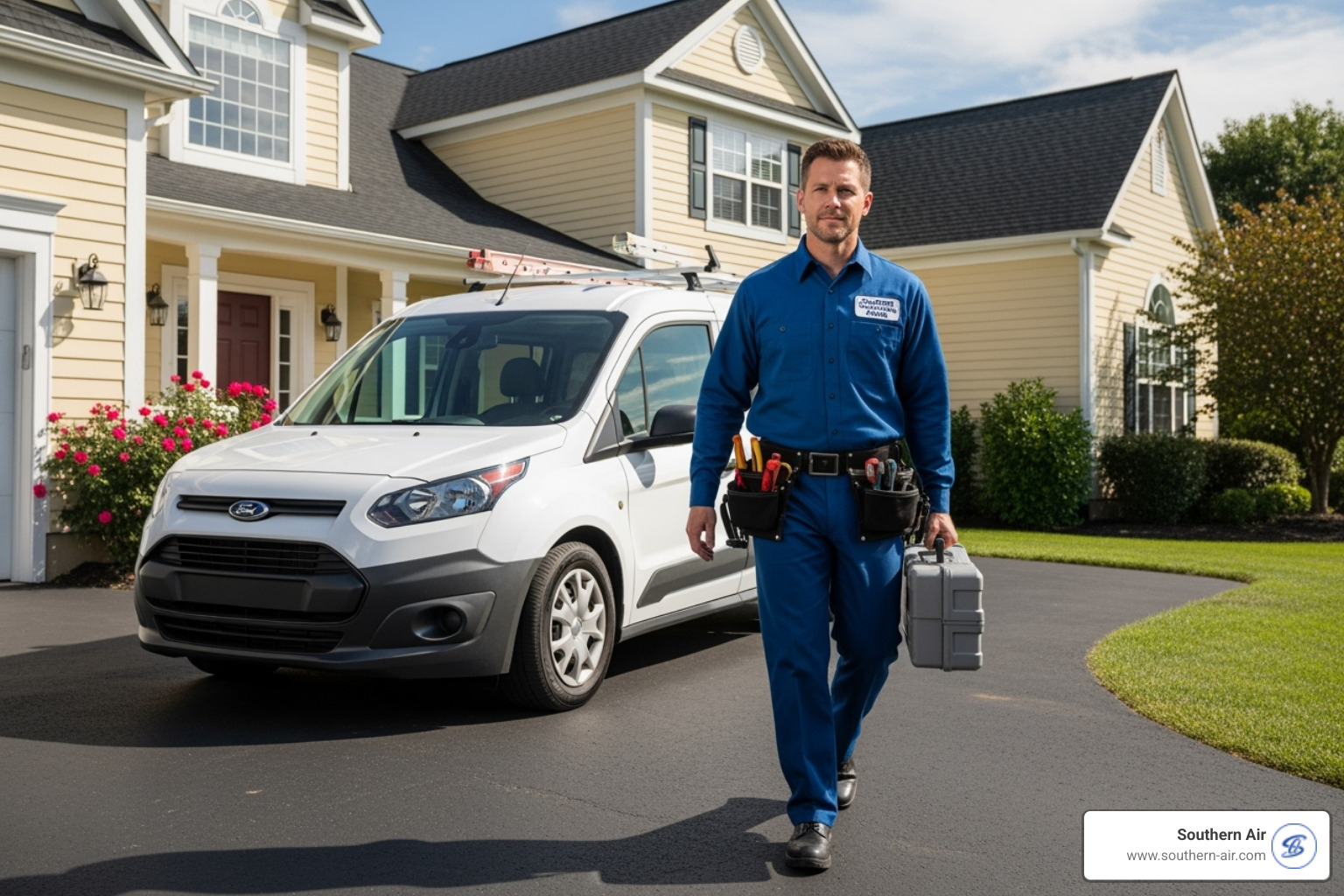
How to Vet a 24/7 HVAC Company
A reliable emergency HVAC company should meet several key standards. Look for these indicators:
- NATE Certification: NATE-certified technicians have proven expertise in heating and cooling systems.
- Online Reviews: Check reviews for mentions of emergency responsiveness, professionalism, and fair pricing.
- Licensing and Insurance: This protects you from liability and ensures the company meets local standards. Reputable companies will verify their credentials.
- Response Times: A genuine 24/7 company provides realistic arrival estimates. Services like our 24 Hour AC Repair Lynchburg VA understand that urgent situations require urgent solutions.
- Live Customer Service: You need a real person who can dispatch help immediately, not an answering machine.
Questions to Ask Before Hiring
Before a technician arrives, ask these questions to protect your wallet and peace of mind:
- Availability: When can they arrive and how long will the repair likely take?
- Experience: Are they familiar with your specific system brand?
- Licensing: Can they provide their license number for verification?
- Estimates: Will they provide a written estimate before work begins?
- Fees: What are the after-hours or emergency fees?
- Warranty: Is there a warranty on emergency repair work?
- Parts: Do they carry common replacement parts on their service vehicles for a one-visit fix?
The Typical Cost of Emergency HVAC Repair
Emergency HVAC repair costs vary, but understanding the variables helps you prepare. The complexity of the problem is the biggest factor; a simple capacitor replacement costs far less than a new compressor.
Time factors also influence price. Expect an after-hours surcharge of $50 to $150 on top of the standard service call. Holiday and weekend rates may be higher. Parts requirements and repair complexity also affect the final bill.
Most reputable companies charge a diagnostic fee to assess the problem, which is often applied to the repair cost if you proceed. For comprehensive services with fair pricing, explore options like HVAC Repair Lynchburg VA for both emergency and routine needs.
Prevention is Key: How Regular Maintenance Avoids Breakdowns
While knowing how to handle an emergency HVAC repair is essential, preventing emergencies is even better. Homeowners who schedule regular HVAC maintenance are 50% less likely to experience an emergency breakdown. That means more peace of mind, comfort, and money saved on costly repairs.
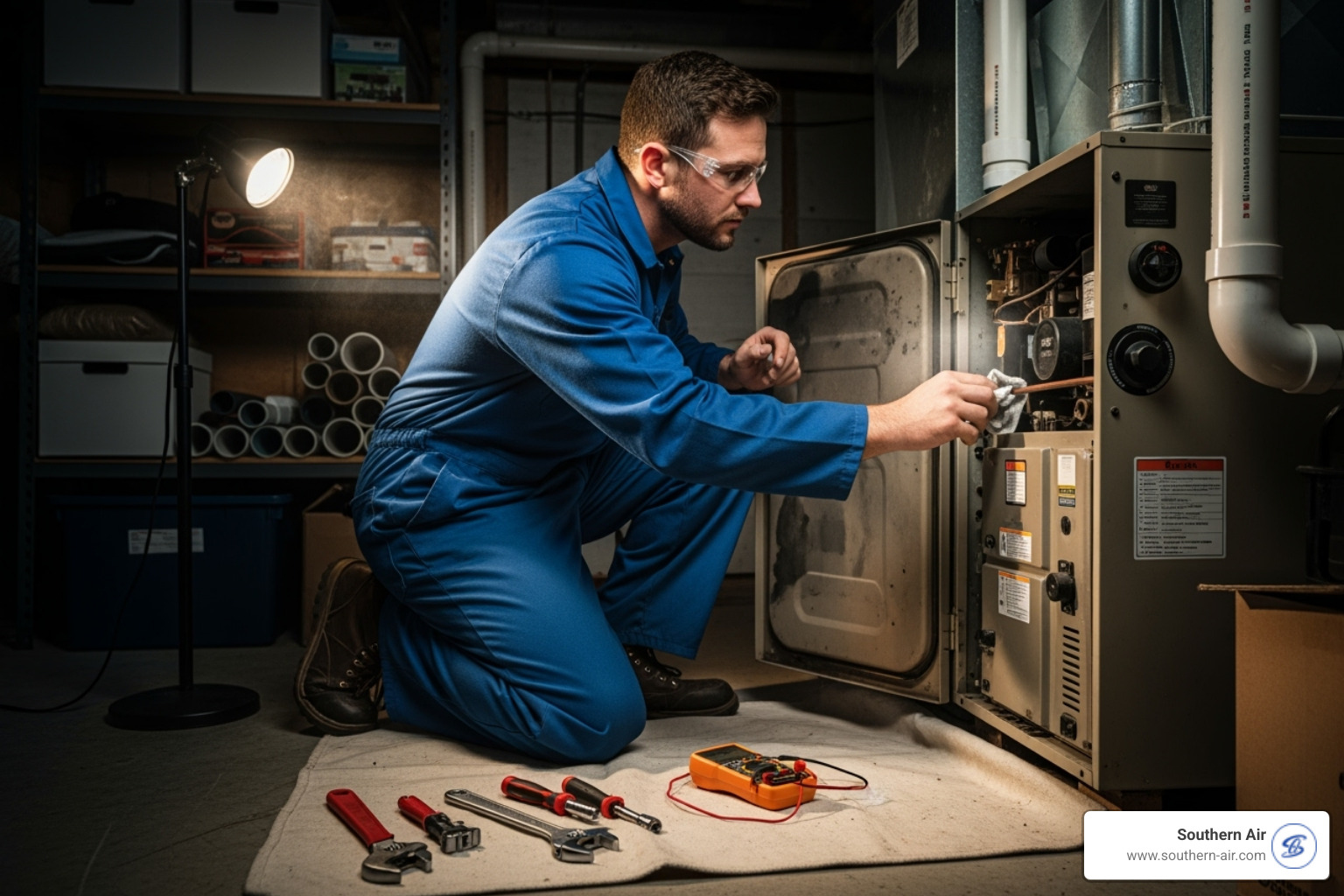
The Role of Routine Tune-Ups
Think of your HVAC system like a car; it needs regular attention to run smoothly. Scheduling annual service is the foundation of good HVAC care. During these visits, technicians perform a comprehensive check-up that catches small problems before they become big ones. This includes cleaning coils and components, checking refrigerant levels, and inspecting electrical connections to ensure safety and efficiency.
By lubricating moving parts, checking thermostat accuracy, and inspecting air filters, we address the little things that cause major system failures. Whether you need heating or cooling service, we offer Heating Service Lynchburg VA and AC Service Lynchburg VA options.
Benefits of a Maintenance Plan
Investing in a maintenance plan extends far beyond emergency prevention.
- Reduced Risk of Breakdowns: Technicians can fix worn parts or dirty coils before they cause a system shutdown.
- Improved System Efficiency: A well-maintained system can operate 15-20% more efficiently, leading to lower energy bills.
- Extended Equipment Lifespan: Regular maintenance can add years to your system's life, delaying a costly replacement. Well-maintained systems can last 15-20 years, while neglected ones may fail in just 8-10 years.
- Priority Service: Maintenance plan customers often get faster attention when something does go wrong.
- Better Air Quality: Regular filter changes and coil cleaning mean healthier air for your family.
Learn more about keeping your system running strong with our guide on Preventing HVAC Breakdowns: Tips.
Frequently Asked Questions about Emergency HVAC Repair
When your HVAC system quits unexpectedly, questions arise. As a trusted Lynchburg company since 1946, we've heard them all. Here are the most common questions we get during stressful HVAC emergencies.
What is considered an HVAC emergency?
An emergency HVAC repair is needed for any situation that puts your family's health, safety, or property at risk. This includes no heat during freezing weather or no air conditioning during a dangerous heatwave, especially with vulnerable individuals at home. Other clear emergencies include gas leaks (rotten egg smell), burning smells, or electrical issues from your system, which can signal fire hazards. Major water leaks that can cause property damage are also emergencies.
How much more does emergency HVAC service cost?
Emergency HVAC repair services typically include an after-hours fee on top of the standard service call, often ranging from $50 to $150. This fee covers having technicians available 24/7. The final cost depends on the specific repair and parts needed. We always recommend asking for a written estimate before any work begins so there are no surprises.
Can I wait until morning to call for a repair?
This depends on the situation. If there's an immediate safety risk like a gas leak or burning smell, call immediately and ensure your family is safe. For other issues, assess the risk. If indoor temperatures are falling below 50°F in winter or rising above 95°F in summer, waiting could pose a health risk from hypothermia or heat-related illness. Waiting can also turn a small problem into a more expensive one, like a failed furnace leading to frozen pipes. If you can remain safe and comfortable with temporary measures, you might choose to wait for regular business hours to avoid emergency fees.
Don't Wait for a Catastrophe, Get Expert Help Now
When your HVAC system fails, you now have the knowledge to handle the situation. Emergency HVAC repair is manageable when you know the right steps.
Safety always comes first. If you smell gas or see smoke, shut off your system and call for help immediately. Acting quickly on warning signs can prevent a minor issue from becoming a major catastrophe. While simple troubleshooting is useful, professional expertise matters for complex repairs where your comfort and safety are on the line.
Since 1946, Southern Air has been the trusted choice for homeowners throughout Virginia, North Carolina, and West Virginia. We understand the stress of these situations and are committed to restoring your system quickly and safely. Our team serves Lynchburg, Ridgeway, Short Pump, Richmond, Winchester, and surrounding areas with the dedication that has defined us for decades.
The best emergency is one that never happens. Regular maintenance prevents most breakdowns, but when disaster strikes, you need experts you can trust.
When you need reliable and fast service, trust the experts at one of the top AC companies in Lynchburg, VA. Don't let a small problem become tomorrow's emergency. Give us a call today.
